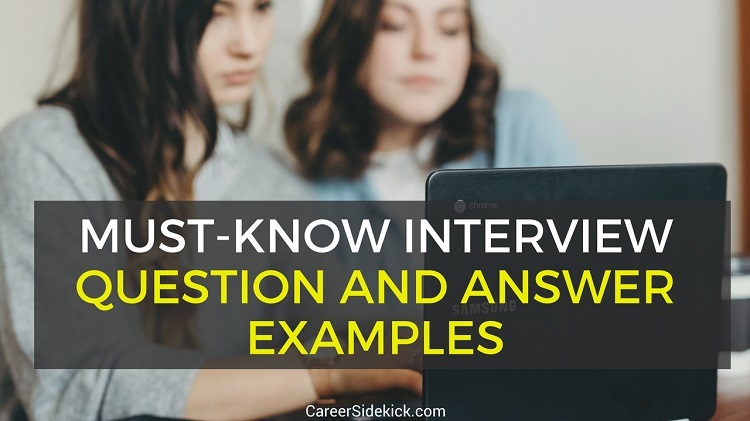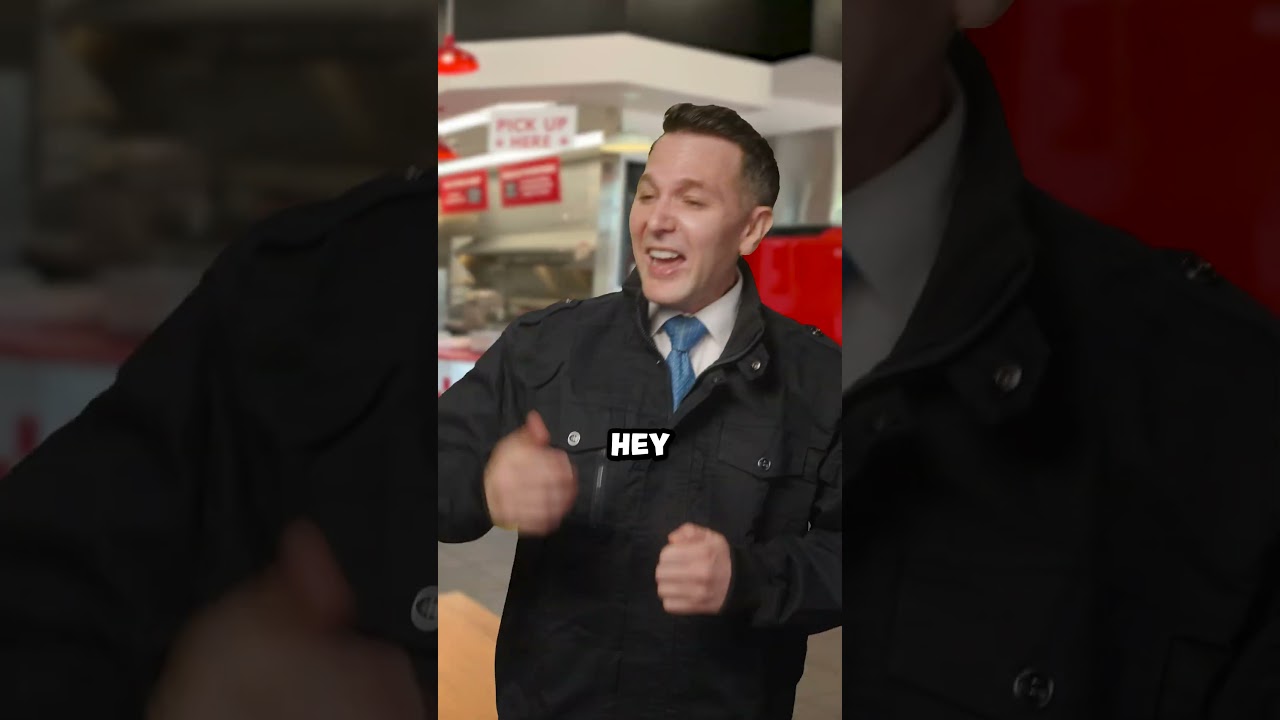
If you may have interviews arising, this text is for you. You’re going to get the highest job interview questions and solutions examples, plus do’s and don’ts to get you able to ace your subsequent interview.
Make positive you’re prepared for every of those questions by reviewing our notes on what the hiring supervisor is in search of, the errors to keep away from, and instance solutions that can impress the employer.
Let’s get began..
15 Interview Questions and Answers Examples
These are the highest interview questions try to be able to reply, with word-for-word examples for every reply together with do’s and dont’s.
Practice and get snug with these questions and reply examples earlier than your interview and you’ll really feel extra assured, whereas giving a lot better solutions.
1. What have you learnt about our firm?
This is likely one of the most common questions to practice for. You’re very prone to hear it in an early-stage interview, particularly a phone interview.
In the pattern solutions under, you’ll see that the purpose is to point out them you’ve carried out your analysis and didn’t apply to their firm with out realizing something about them.
If you don’t appear to be you already know something about them, you’ll come throughout as determined – any individual who will take any job they’ll discover. And that’s going to make you unattractive to any good employers on the market.
So once they ask, “what do you know about our company?”, your major purpose is to point out you’ve carried out your analysis or knew about their firm earlier than making use of. If you do that, you’ll be high-quality.
Do:
- Make positive to analysis the corporate earlier than the interview (on their web site, their LinkedIn web page, and Google)
- Understand what trade they’re in, what they promote and how they make cash
- Try to have some sense of their firm measurement. Are they 100 workers? More than 10,000 workers?
- In your reply, present you’ve carried out analysis and present that you simply’re enthusiastic about interviewing with their specific firm
Don’t:
- Say you don’t know something
- Say details which are incorrect otherwise you aren’t positive about (it’s higher to know one or two details which you could say precisely, than 5 details you’re undecided of)
Interview reply instance 1:
“From what I read, your company is one of the leaders in providing security software to other businesses. I read the list of clients on your website. Do you mostly serve Fortune 500 clients? I saw a couple big Fortune 500 companies mentioned on the list, including ___ and ___.”
Interview reply instance 2:
“You’re one of the largest investment banks in the US. Your headquarters is in Raleigh, NC, and you have 25,000 employees worldwide based on what I read on your website.”
2. How did you hear in regards to the place?
When they ask “how did you hear about the position?”, the interviewer simply needs to know if you happen to’ve taken the time to analysis the corporate and in case you have a real purpose for wanting to speak with them. Mention a product, a mission assertion on the web site, a repute for proficient workers, or no matter else appears relevant to that particular firm. Come up with an awesome purpose. Don’t make it appear to be they’re only one firm amongst many. Or that you simply’re sending your resume out to them for no specific purpose aside from wanting a job.
This is likely one of the easiest query and reply situations in any interview, however that doesn’t imply it could actually’t destroy your probabilities on the job if you happen to reply incorrectly.
Do:
- Be clear, direct and upfront
- Tell the reality until it’s one thing very embarrassing (for instance, once I was a lot youthful, my Mother really discovered me a job to use to. That does *not* sound nice, so I instructed them a buddy noticed the job posting and talked about it to me. A white-lie is okay however solely when wanted).
- Explain why the job you, if doable (e.g. “I was excited to apply because ___”)
- Compliment them if doable (e.g. “My colleague said you’re one of the top software firms in Dallas”)
Don’t:
- Say you don’t keep in mind or don’t know
- Sound not sure of your self
- Hesitate
Good reply examples:
“I found the position while looking for jobs online”
“I heard about it from a colleague/friend”
“Your company was recommended to me by somebody I worked with in a previous job and had heard good things about your organization”
“I saw the job posted on LinkedIn, and the position seemed interesting so I wanted to learn more”
3. Why did you apply for this place?
When they ask “why did you apply for this position?”, decide one thing particular that you. If you say you’re keen on their merchandise, inform them why. That’s the important thing to giving a convincing reply for this job interview query.
Stay away from sounding such as you’re determined, or that you really want simply any job. Yes, if you happen to had been laid off it’s okay to say that, however then re-focus the dialog on precisely what you’re in search of within the subsequent alternative and why you’re feeling their firm may need it.
You have to sound such as you need the RIGHT job and that you simply’re being choosy. Companies need one of the best performers, and one of the best performers are choosy of their job hunt. Stay away from negatives and complaints too. Don’t bad-mouth your present firm or boss. Focus on the positives of the corporate you’re interviewing with.
Do:
- Make them really feel such as you’re thinking about them for a particular purpose
- Show you’ve carried out your analysis and perceive what the job entails
- Phrase the whole lot as a constructive. Don’t badmouth your present scenario, simply speak about what you hope to achieve by coming to work for them (experiences, challenges, alternatives).
Don’t:
- Say you simply want a job typically
- Explain that you simply’re unemployed and simply want to search out work
- Say you simply want cash or have payments to pay so that you want work
- Badmouth your present boss or firm and sound such as you simply wish to go away there, nonetheless you possibly can
- Sound determined, or sound like you’ll take any job you may get and you don’t care what it finally ends up being
- Mention some other private causes like “I need to find a shorter commute.”
Example reply 1:
“Since beginning my career, I’ve wanted to work for a larger organization in this industry, and I know you’re one of the leaders in this space. I’m very interested in your products/services, especially the mobile applications you’re building recently, so I’d be excited to come here and grow my skills with an organization like yours.”
Example reply 2:
“I’ve heard great things about the work environment here from a few colleagues. And when I saw this job posting, it seemed to match my skills very closely. For example, I saw on the job description that you need somebody who’s an expert in Java programming. This is what I focused on in both of my previous positions, and was even the focus of my academic work before graduating university. I consider myself an expert in Java and it’s a skill I hope to continue specializing in.”
4. Why are you seeking to go away your present firm?
Now, not everyone seems to be job looking whereas employed, however if you’re – this is likely one of the most necessary interview questions and solutions to know.
The most necessary factor once they ask why you are looking to leave your current job is to remain constructive and by no means badmouth.
How do you sound constructive? Rather than complaining or speaking badly about your present scenario, say that you simply’re in search of extra of one thing.
Is your present boss a jerk ? Say that you simply’re in search of an surroundings with extra management you possibly can be taught from.
Do:
- Sound constructive and concentrate on what you wish to achieve by making a transfer
- Show gratitude in your present job (e.g. “This job has been great and I’ve learned a lot in the 2 years I’ve been here, but I feel I’m ready for ___ now.”)
- Sound such as you’re bold, motivated, and keen to search out the subsequent problem in your profession.
Don’t:
- Badmouth your present employer in any method
- Sound such as you’re making an attempt to flee a foul scenario, otherwise you’re failing or not becoming in at your present job
- Say you’re struggling or failing to carry out the work
- Say it’s too tough or irritating
- Say you’re undecided
Good pattern reply:
“I’m looking for more leadership opportunities. I’ve been at my company for three years and have really enjoyed the experience but I feel in order to take the next step in my career, it’d be helpful to join a larger organization and use what I’ve learned in the past to lead more projects. That’s why this Project Manager role excited me.”
5. Tell us a few problem you’ve confronted and the way you dealt with it
Focus on a particular work-related problem and speak about the way you overcame obstacles, used it as a studying expertise, used the sources round you (together with folks/colleagues if relevant), and ended up with a constructive consequence! That’s how you can reply this interview query. Keep it work associated, not private.
Do:
- Explain the scenario, the duty you wanted to perform, and what methodology you selected (and why)
- Share the result. What was the consequence?
- Share what you discovered from the expertise. Did you are taking away information that has helped you in your profession?
Don’t:
- Share any story that entails private conflicts, arguments or disagreements at work
- Talk about an argument you had
- Talk a few problem that you simply didn’t overcome, or didn’t discover a resolution for
Answer instance:
“In my last job, we were facing a tough deadline and my boss was out for the day. Our client was expecting a project to be delivered by 5PM, but we were far behind schedule. I took the lead on the project, delegated tasks to the four other team members in a way that I thought would utilize everyone’s strengths best. And then I re-organized my own personal tasks so I could dedicate my entire day to contributing to this project as well. The project was a success and we delivered the work on-time. I went on to lead more projects after that, and used what I learned to be a better project manager.”
6. How a lot cash are you seeking to earn?
Unfortunately this query is left off of many lists of job interview questions and solutions examples. But it’s extraordinarily necessary, and the improper reply right here can price you hundreds of {dollars} within the negotiation in a while.
DON’T say a quantity. Why? you may have the least quantity of leverage doable at this level, assuming you’re early within the interview course of. You haven’t completed interviewing with them, they don’t know if you happen to’re any good or in the event that they even wish to rent you. So you possibly can’t command a excessive wage proper now. If you go too low together with your value, they’ll maintain you to it later. Go too excessive? You’ll scare them off earlier than they even know what you’re price!
It’s a lose-lose. Don’t do it. So keep in mind… while you’re getting ready what to say in a job interview, particularly an early stage interview, wage objectives shouldn’t be part of it!
Do:
- Stand your floor and inform them you don’t have a quantity in thoughts but, or aren’t positive.
- Repeat this a number of occasions if wanted (in the event that they strain you or “push back” after your first response).
Don’t:
- Tell them a particular wage you’re hoping for
- Tell them a spread you’re hoping for
Example reply:
“Right now I’m focused on finding a job that’s the right fit for my career. Once I’ve done that, I’m willing to consider an offer you feel is fair, but I do not have a specific number in mind yet, and my priority is to find a position that’s a great fit for me.”
For extra data, right here’s a full article on how to answer desired salary on applications and interviews.
7. Do you may have any questions for us?
If you don’t ask good questions to every individual you communicate with, you might be not possible to get employed.
You can ask in regards to the work, the coaching, the challenges you’d face, the general course of the corporate.
Don’t ask about wage, advantages, break day, or something that isn’t associated to the work. Wait for them to carry it up, or till you already know they wish to give you the place.
FYI listed here are the 105 best questions to ask the interviewer.
Do:
- Be able to ask questions to each single individual you meet with
- Ask in regards to the firm, the workforce, and most significantly – the precise job
- Ask about stuff you heard through the interview that you simply’d like extra details about
- Ask in regards to the interview course of: (e.g. “when will I hear feedback, and who will be in touch after this?”)
Don’t:
- Say you don’t have any questions
- Say “so-and-so answered all my questions already”
- Ask about wage, advantages, work hours, dress-code, or anything that isn’t associated to the precise work you’ll be doing for them. Wait for them to carry this up in a second or third interview
Example reply:
“Yes, I have a couple of questions actually. The first thing I wanted to ask: is this a newly-created position, or did somebody hold this role in the past? And if so, what did that person go on to do after this position?”
8. Why ought to we rent you?
Employers ask, “Why should we hire you” to see how effectively you perceive the position, and to listen to your perspective on how your expertise may help them.
Try to speak about them and the way you’ll assist them. What will probably be higher for them in the event that they rent you? What will you enhance for them?
And present you’ve carried out your analysis. Make it clear that you already know what this place entails, and you’re able to carry out the duties.
Do:
- Be assured in your expertise and talents
- Talk about particular issues you possibly can assist them do or obtain in the event that they rent you
- Do your analysis earlier than the interview and perceive their wants, so you possibly can “tailor” your solutions and goal the precise issues they’ll want in the event that they rent you on this position
Don’t:
- Say “I don’t know”
- Say “You should hire whoever you want”
- Give a generic reply that’d match any firm. You really want to “tailor” this to the precise duties you’ll be performing in THIS particular job. Otherwise your reply won’t impress them.
Example interview reply:
“I read on the job description that you’re looking for someone with experience in ____. I’ve done that for 3 years and can immediately help you accomplish ____”.
9. Why do you wish to work right here?
If they ask “why do you want this job?”, present you’ve carried out loads of analysis to study them earlier than coming in to interview. You wish to make them really feel such as you selected them for a purpose. This is similar to the earlier query: “Why did you apply for this position?”
Show them that you already know what that their job entails (at the least as a lot as you could possibly be taught from the job description and firm web site), and that you simply’re excited to be interviewing for this place.
Do:
- Mention particular, work-related explanation why their job and firm curiosity you
- Talk about your personal profession objectives and how this job and firm matches these objectives
- Sound excited in regards to the alternative to work for them
- Show you’ve carried out your analysis
Don’t:
- Say, “I have bills to pay and need money”
- Say, “I just need a job”.
- Share any private particulars like, “I live 5 minutes away so it would be a very short commute”
Sample interview reply:
“I’ve been actively searching for jobs since graduating with my Nursing degree. I’m interested in intensive care and emergency medicine and I’ve seen your hospital mentioned as having one of the best ER’s in the region. I thought the job description matched up well with my background, and saw some of my personal strengths mentioned, like multitasking and being able to thrive in a fast paced environment, so I’d love to begin my career here.”
10. Tell me about your self
This is likely one of the hottest interview query and reply examples folks search for, as a result of it’s extraordinarily widespread to listen to AND tough to reply. Here’s how you can deal with it:
Keep it skilled when answering the query of “tell me about yourself“. You don’t need to share personal details.
To answer, walk them through your background, starting at how you began your career or your current line of work. Take them through key accomplishments, key career moves you’ve made, and end by sharing what you’re looking to do next in your career and why you’re job hunting.
Do:
- Focus on sharing your professional story only
- Keep it under 2 minutes
- Walk them through how you got started in your career, key moves you’ve made, and then bring them up to speed on your current situation
Don’t:
- Share personal details
- Talk for more than 2 minutes
Interview answer example:
“I started my career in Marketing after graduating with a Business degree in 2013. I’ve spent my entire career at Microsoft, receiving two promotions and three awards for outstanding performance. I’m looking to join a smaller company now, and take on more leadership and project management.”
11. Why did you permit your final job?
There are a whole lot of good solutions to this interview query. There isn’t only one “right” reply. Here are some pointers:
If you selected to go away by yourself phrases, keep constructive and concentrate on what you wished to achieve from the choice, fairly than bad-mouthing or specializing in negatives you wished to keep away from.
And if you happen to had been fired or laid off, be upfront and clear. You’re not going to make employers wish to rent you by being obscure or making an attempt to cover one thing.
If you bought fired, present what you’ve discovered from the expertise, and what you’ve carried out to ensure this doesn’t occur once more. That’s how you can spin it right into a constructive.
Do:
- Be clear and direct and tackle the query head-on
- If you had been fired, come clean with it and share what you’ve carried out to ensure this by no means occurs once more
- If you selected to resign, concentrate on the constructive stuff you hoped to achieve by transferring to the subsequent alternative, fairly than badmouthing or speaking in regards to the negatives in your final position
Don’t:
- Don’t badmouth or complain
- Never say you resigned due to a disagreement or argument with a coworker
- Don’t make it sound like cash is your important precedence
- Don’t attempt to conceal details or keep away from the query; this can simply result in extra questions and suspicion from the interviewer
Example reply:
(*15*)
You may also get extra concepts for how you can reply this on our record of 20 answers for “why did you leave your last job.”
12. What is your best weak spot?
When they ask, “what’s your greatest weakness?” , you wish to identify an actual weak spot.
I extremely suggest selecting one thing skill-based, not personality-based.
You by no means wish to say you battle working with others, otherwise you’re dangerous at resolving disagreements, or taking course from a supervisor, and so on. Those issues will get you rejected in the interview.
So decide a particular ability, however decide one thing that received’t severely impression your potential to do that job.
For instance if the job entails knowledge entry with Excel spreadsheets all day, you do not need to say Excel is your weak spot. Or that you simply battle listening to particulars.
Finally, finish your reply by explaining what you’re doing to beat or enhance your weak spot.
Take a have a look at the do’s and don’ts, and the interview reply instance under, to get a way of what your reply would possibly sound like.
Do:
- Name an actual weak spot
- Pick one thing that’s skill-based, not personality-based. For instance, say, “I’m not particularly strong in Microsoft Excel…”, fairly than, “My weakness is working on a team and following directions.”
- Mention what you’ve carried out to beat this weak spot and enhance lately
Don’t:
- Don’t give a pretend weak spot like, “I work too hard”
- Don’t attempt to be humorous with a solution like, “Kryptonite.” Hiring managers have heard it over and over
- Don’t inform them you don’t have any weaknesses
- Don’t identify a personality-based weak spot (like “I have trouble getting along with colleagues”)
- Don’t identify a weak spot that can severely impression your potential to reach their job
Example interview reply:
“I’m not particularly strong in social media marketing. For the first few years of my career, I focused entirely on email marketing. That’s still what I specialize in, which is why I applied for your Email Marketing Manager job. But I’ve realized it’s also helpful to understand the principles of social media marketing because some of the strategies that work there also work well in email. So I’ve started spending a couple hours a week of my own time studying and learning this new area, and it’s helped me a lot.”
13. Where do you see your self in 5 years?
There are three large causes interviewers like to ask “where do you see yourself in 5 years?“:
- They want to see if you’ve thought about your professional future
- They want to make sure you’re ambitious and hard-working
- They want to make sure the job they’re offering fits with your goals
So, pick a work-related goal of where you’d like to be 5 years from now, and make sure it’s slightly challenging or ambitious-sounding.
You don’t want to say, “I see myself in the same position 5 years from now.”
And make certain to share a purpose that’s associated to the kind of job you’re interviewing for. You wish to sound just like the expertise you’ll achieve on this job matches your long-term objectives.
Otherwise they’re going to be scared to rent you. Why would they give you the job if it doesn’t match the objectives you described to them? You’d be unhappy, bored, and would in all probability stop inside the first yr. No firm needs this.
Do:
- Show you’ve considered this matter and query
- Sound bold and motivated
- Be reasonable. Don’t say you wish to be CEO in 5 years if you happen to’re entry-level
- Make positive your reply is expounded to this job. They received’t rent you for a job that has nothing to do together with your 5-year purpose
Don’t:
- Be sarcastic or give a joke reply like, “I plan on having your job”
- Say you’re undecided, or say you’d be blissful staying in the identical position for five years (most firms don’t wish to hear this)
Example interview reply:
“I’m glad you asked. In 5 years I see myself taking on more responsibilities, either through management or higher level individual contributions. I’m not sure which path will make sense to pursue, but I know my goal right now is to build a strong foundation and gain valuable experience so that I’ll have a successful future in this industry.”
14. Tell Me About a Time You Failed
This is a standard interview query that employers ask to see if you happen to’re capable of be taught from errors and bounce again when issues don’t go your method.
They all the time wish to see if you happen to can own-up to it and be accountable and really admit to your failures.
So while you reply, “tell me a time when you failed”… listed here are crucial do’s and don’ts to observe:
Do:
- Admit to an actual failure
- Describe the scenario and what went improper
- Show that you simply take duty (fairly than blaming others), and present you discovered from it
- Ideally, speak about the way you used that lesson to get a unique consequence subsequent time you had been introduced with an analogous problem (e.g. the way you turned a previous failure right into a future success)
Don’t:
- Say you by no means fail
- Talk a few failure however then blame others and speak about the way it wasn’t actually your fault
- Give a long-winded reply that goes off-track. You actually must be concise and present you possibly can inform a transparent story. That’s yet another factor employers search for once they ask this interview query.
Sample interview reply:
“In my most recent position, I had recently been promoted to Supervisor, and was managing the department on my own right before the department closed. An employee was acting out and I confronted him in front of everybody. It made the situation worse and caused a lot of distraction for every employee on the floor. I failed to lead properly in this situation, and spoke to my manager the next day to discuss what I could have done differently. We both agreed that I should have handled this in-private with the employee, by asking them to step inside my office with me. If I had done this instead of reacting the way I did, the situation would have turned out much better. From that point onward, I am always conscious of whether a discussion with a team member should occur in public or behind closed doors, and it made me a better leader.”
15. How do you make choices?
This is one other one of the widespread interview questions you’ll hear in any trade.
You can also hear it phrased as behavioral interview questions like, “Tell me about a time you had to make a difficult decision? How did you handle it and what did you decide?”
With any of those decision-making interview questions, hiring managers will wish to know that you simply’ve made good choices previously and are snug with the strain of a tricky resolution. This will make them snug that you simply’ll make good choices in your subsequent job, too – whereas working for them.
So to point out the hiring supervisor that you simply’re a great match, put together to elucidate the way you set up and construction your choices. You wish to present them you’re calm and observe a logical system while you make important decisions.
Answer pattern:
“I typically list out all available options and then weigh the pros and cons and expected outcomes of each. If other teams or people are impacted by the decision, I’ll ask for their thoughts, too. Sometimes a peer will point out a pro or con that I hadn’t seen, so I find it helpful to talk to others when appropriate. After this, I’ll choose the course of action that I feel is most likely to bring about the best outcome. I also weigh risks of each possible decision. If one decision has a good potential outcome but comes with too much risk for the company, then it may not be the right choice. Would you like me to give an example? Or did that answer your question…”
UPDATE:
If you may have interviews arising and don’t wish to go away something to likelihood, I’ve created a new information the place you possibly can copy my actual step-by-step methodology for getting job gives. You can get more details here.












